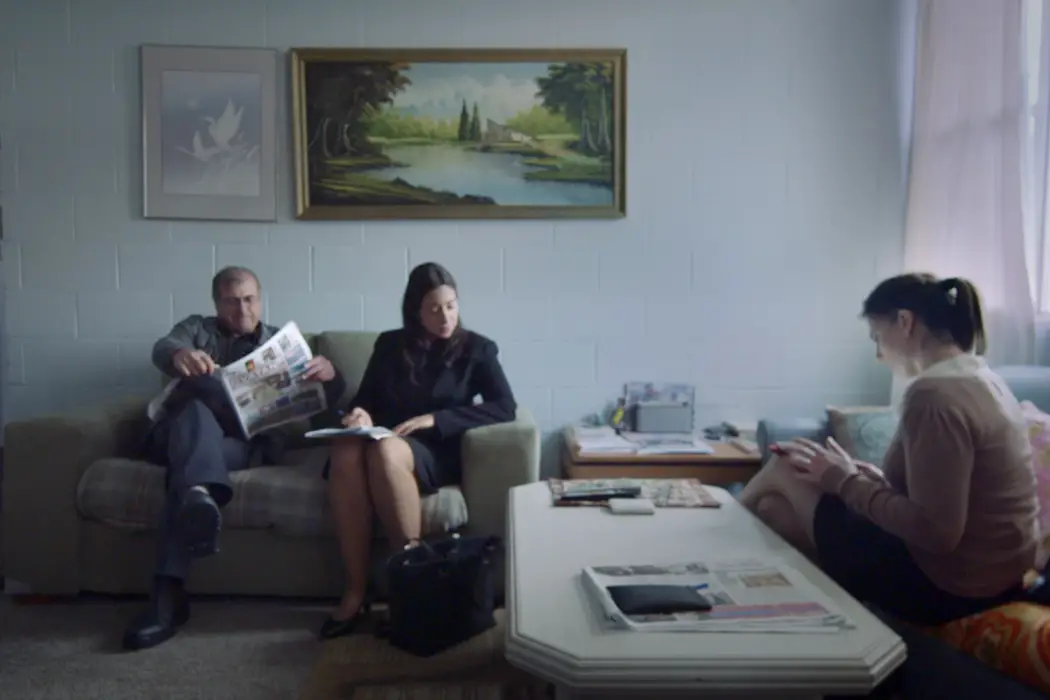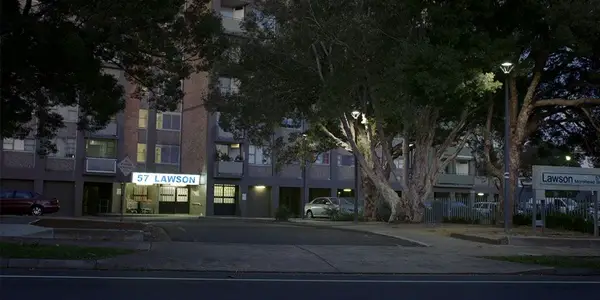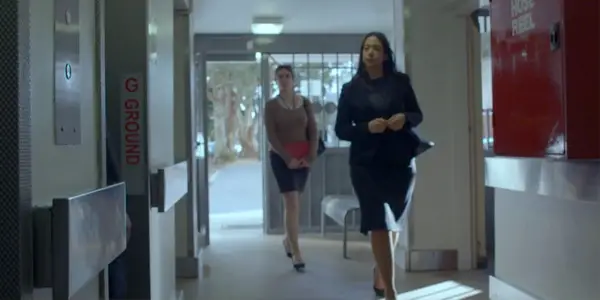57 LAWSON: Stories From The Poets Corner Flats

Alex is a 28 year-old West Australian who has a…
In the opening shot of 57 Lawson, the viewer’s gaze is left adrift, scouring the screen for any form of visual clue as to what to focus our attention on in Ben Ferris’ impassive, hyperrealist documentary on Sydney’s social housing crisis, as told through the tenants of the ‘Poets Corners Flats’, a trio of government-owned apartment blocks built back in 1965 to solve a severe housing shortage.
A stationary camera patiently watches the three buildings from a distance, during the cobalt period between day and night, with the voyeuristic non-judgemental footage evoking Michael Haneke‘s legacy, recalling his abandonment of compositional standards in favour for blurring the line between formal narrative and genuine reality. This is appropriate when talking about Ferris‘ new film, a documentary-drama hybrid which acts as an archive for the titular residence, as of the time of its 2016 shoot date, the future of the building was uncertain, on the brink of being bought out by billionaire developers and demolished, risking the future for all of the residents who live within.
On the Brink
57 Lawson may begin like Haneke, but Ferris’ approach is more similar to that of Chantal Akerman, employing her signature trademarks of static long takes, naturalistic ambient sound and a lack of any conventional plot to paint a portrait of the fleeting nature of modern urban life, specifically the Redfern residents who are to be affected by the NSW’s housing commission’s uncivil decision to displace them. As mentioned in the press notes, Ferris has intended to counter the rapid development of Sydney with a deliberate slowness, using a sterile silence to draw the viewer into a subjective state of understanding, because as you can tell already, this isn’t exactly a film you watch for entertainment purposes.

In three shots of long-take minimalism, James Barahanos’ camera edges closer to the building, capturing the surrounding transient spaces and the people who move within them. This hints at the diversity of Sydney’s population, before finally entering the doomed apartments, abbreviating its occupant’s stories into a trio of mundane vignettes which evoke the spirit of working class solidarity and familial communities.
Spectator Sport
The film’s true value lies not in its documentation of everyday life, but in its observation of a community before its collapse, as the viewer becomes the fly-on-a-wall for a conversation between a family. As the female matriarch nonchalantly describes her recent hospital visit, whilst in an adjacent apartment, another female senior tenant reads out a cake recipe, which transitions into an Iranian student preparing herself to go to bed. These scenes are mundane and monotonous (this is the most realistic episode of Gogglebox you’re ever gonna see), but they’re effective in portraying the humanity of these people, as without any narrator or talking heads to plead for our sympathies, the audience is allowed to connect to these stories through the basic merits of compassion and understanding, by simply observing the regular lives of Australia’s lower class citizens.
The routine nature of these sections makes the transition from documentary to drama quite seamless, as Ferris plays out a re-enactment between two female government workers and an elderly Turkish occupant, anticipating the many painful conversations that are to take place when the building is finally sold off. This is the closest that the film comes to presenting any form of political position (apart from an opening quote by Mahatma Gandhi), as the older resident is shown as fairly bewildered and afraid at the new change (who is profiled in a rare close-up, a real jarring shift in cinematography) whilst the Department of Family and Community Services employees treat him with superficial consolations, noting in the elevator ride down that they’re not even sure which building they’re even in.

57 Lawson can best be described as a nostalgic piece, in style, subject and sensitivity, longing for a time before city real estate was quickly handed out to the highest bidder, when (as mentioned in the beginning) the NSW housing commission was started to fix a severe housing crisis, but it now seems it’s only making the matter worse. Marta Maia’s austere editing establishes the film’s thematic meanings with an innovative subtlety. Cutting from the Iranian student’s sleep to the illuminated night-time cityscape of Sydney suggests a universality, that we may be watching the interior lives of the Poets Corner Flats residents, but they merely represent just a singular section of Sydney’s concrete jungle, with thousands of ordinary citizens going through the same types of daily struggles, triumphs and procedures.
57 Lawson: Conclusion
As 2 years have passed since 57 Lawson’s premiere at the Sydney International Underground Film Festival (which just finished its 2018 run), Ben Ferris’ experimental docu-drama hybrid has aged as an important archive of a brief period of time, a lyrical tribute to Australia’s often ignored lower class population, documented on the brink of a substantial socio-political change. Stripped of any melodrama or sentimentality, 57 Lawson emerges as a fascinating entry into Australia’s distinctive body of social documentaries.
57 Lawson will screen at the Golden Age Cinema in Sydney on 21 October 2018 at 12:30pm, and at Melbourne’s ACMI Cinema on 27 October 2018 at 11am, Tickets available here.
Does content like this matter to you?
Become a Member and support film journalism. Unlock access to all of Film Inquiry`s great articles. Join a community of like-minded readers who are passionate about cinema - get access to our private members Network, give back to independent filmmakers, and more.













